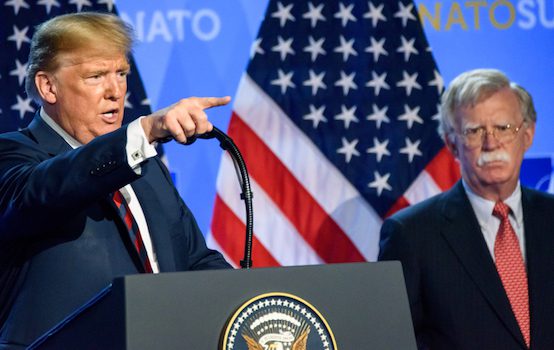Sorry Bolton, We Already Knew Trump Was a Loser on Saudi Arabia

President Trump’s ebullient statement of support for Saudi Arabia in November of 2018—in response to the torture, murder, and dismemberment of dissident journalist Jamal Khashoggi in a Saudi embassy—was a self-serving ploy, former National Security Advisor John Bolton alleges in his new White House exposé.
The “main goal of the missive was to take away attention from a story about Ivanka Trump using her personal email for government business,” The Washington Post reported after reviewing Bolton’s book ahead of its publication. “This will divert from Ivanka,” Bolton quotes Trump as saying. “If I read the statement in person, that will take over the Ivanka thing.”
Whether Bolton’s account is correct may be impossible to verify. Trump, predictably, has condemned the book, calling it a “compilation of lies,” a vengeful sabotage in which Bolton puts “pure fiction” in Trump’s mouth. In the case of the Saudi Arabia statement, however, it’s not obvious how such a denial does Trump any good: His decision to strengthen Washington’s ties to Riyadh instead of severing them was indefensible, and that’s true whatever his motive for the timing of those 2018 comments may have been. Bolton’s accusation, if correct, makes a bad move worse, but the policy that move advanced—a policy Trump has maintained since, regardless of Ivanka’s headlines—is the real scandal here.
If indeed intended as a distraction from his daughter’s emails, Trump’s Saudi statement was certainly well-crafted. Here was the American president defending one of the worst regimes on the planet, an oppressive theocracy with an appalling record on religious liberty and a foreign policy that doesn’t shy away from war crimes. Trump’s statement flouted the CIA’s conclusion that Khashoggi’s death was ordered by none other than Saudi Crown Prince Mohammed bin Salman (MBS). Maybe MBS knew, Trump chirped, or “maybe he didn’t!”
The other non-Ivanka context of Trump’s remarks was the school bus bombing—the time the U.S.-supported, Saudi-led coalition intervening in Yemen killed 40 children between the ages of 6 and 11. Americans were horrified to learn the strike was conducted with a U.S.-made bomb—so much so that Congress managed to pass a bipartisan resolution to end U.S. involvement in Yemen, legislation Trump would later veto.
Trump referenced Yemen and Khashoggi alike in his statement, redoubling a que sera sera attitude he’d evinced in a Fox News interview two days prior. MBS could be lying in his denial of involvement in the Khashoggi killing, host Chris Wallace noted then. “Do you just live with it because you need him?” Wallace asked Trump. “If Congress were to move to either try to cut off any U.S. involvement in the war in Yemen or to block any arms sales, you won’t go along with it?”
Trump’s answer was vague and meandering, but the policy upshot then—and when he issued the statement, and when he vetoed the Yemen withdrawal resolution, and throughout the nearly two years since—was “yes.” Yes, the Trump administration will studiously ignore every cruelty, every abuse of individual rights, every unsavory association, every murder and war crime, and even every crucifixion to preserve the U.S.-Saudi relationship. Yes, the United States will keep selling Saudi Arabia weapons, giving it intelligence guidance, and otherwise helping it prolong and exacerbate the Yemeni civil war. Yes, Trump will continue to refer to Riyadh as an “ally” (though there is no alliance treaty between Saudi Arabia and the United States) and MBS as his “friend.” Yes, he will maintain the longstanding U.S. policy of deliberately overlooking Riyadh’s grotesqueries for the sake of oil, arms deals, and opposition to Iran.
To oppose that “yes” is not to say the United States can only engage with governments whose hands are clean, if there even is such a thing. We should talk and trade with nations that don’t share the values we purport to represent, both for our own benefit and because that interaction can bring greater prosperity, peace, and freedom to the ordinary people who have the misfortune of living under such regimes.
Yet that diplomatic realism does not mean preserving such close ties with so blatantly vile a government as Saudi Arabia’s. Washington’s support for Riyadh is an unnecessary evil. We do not need Saudi oil—in fact, the United States is now a net oil exporter. Nor do we need to sell weapons to Saudi Arabia, especially not while Riyadh uses those weapons to kill children and sow chaos region-wide. Nor yet do we need to prop up the Saudi-Iran proxy fight in Yemen’s civil war, a fundamentally local conflict that has become a horrific humanitarian crisis and can’t pose the U.S. any existential threat.
Bolton says Trump issued his Saudi statement when he did to alter the news cycle for his daughter’s benefit. If that’s true, it adds an unsurprising layer of petty self-service and politicking to Trump’s behavior. But that layer is not the real scandal here. The real scandal is the Trump administration’s commitment to subordinating U.S. interests and principles to hold the affection of Saudi despots—and that scandal was obvious before Bolton penned a single word.
Bonnie Kristian is a fellow at Defense Priorities, contributing editor at The Week, and columnist at Christianity Today. Her writing has also appeared at CNN, Politico, USA Today, the Los Angeles Times, Defense One, and The American Conservative, among other outlets.